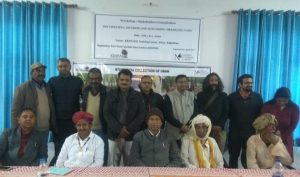First published on 02/03/2020, and last updated on 03/27/2020
By Aman Singh & Nitin Bathla. Aman Singh is ICCA Consortium Council member and Founder of Krishi Avam Paristhitiki Vikas Sansthan (KRAPAVIS), Member of the ICCA Consortium in India.
“Oran” is a colloquial term used to describe certain village commons in Northwestern India. They are forests considered to be the homes of local deities, and thus sacred. The care and respect given to the flora and fauna in Orans because of this sacred nature has led to their becoming essential biodiversity hotspots within larger ecological systems.
Following the Supreme Court order (03/07/2018) declaring all Orans to be “deemed forests”, it became necessary to find ways to document Orans and Dev-vans. Although the Supreme Court order provides a legal basis for their protection, documenting community forests can further secure them by making their existence, location, and ownership visible and known.
Documenting these forest and lands will help protect them from the threats they face from encroachment, mining, urbanization and climate change. The lands remain vulnerable, and the documenting process could help identify ways to sustain them. In order to involve and convince the communities, governmental and non-governmental agencies, as well as the academic community working on community forests, a workshop was convened to create a specific protocol on “Documenting, Securing and Sustaining Orans and Dev-vans”.
More than 50 people, including representatives from communities, forestry research and other research institutions, universities and colleges, the Forestry Department and other governmental agencies (e.g. agriculture, livestock, etc.), and NGOs met and created a unanimous mission statement.

The workshop was organized by Krishi Paristhitki Vikas Sanstan (KRAPAVIS), with the support of Rohini Nilekani Philanthropies, and was held at KRAPAVIS’s Oran Training Centre in Alwar, on February 1-2, 2020. At the close of the workshop, the group announced a statement of its intent to promote the documentation of Orans in order to strengthen their conservation and management. The main points of the statement follow:
- Orans and Dev Vans are a crucial part of the rural wilderness landscape, and yet they are poorly documented in State Land Records. To intervene and protect the forests effectively, or to develop the areas wisely, these regions need to be documented using Geoinformatic techniques (GIS), ODK, and other participatory mapping techniques that combine community knowledge, state records, and earth observation;
- KRAPAVIS’s successful prototype, used in mapping over 100 Orans in Rajasthan for vegetation cover, wildlife, threats, local myths and legends, can be scaled up through a mobile application. Going into the future, it will be important to find ways to democratize the process of documenting community forests and assets;
- The opportunity to map Orans and do “conflict mapping” at the same time, should be taken into account. Identifying areas of disputed ownership will help identify risks to Orans in terms of their ownership, as they confront possible incursions from privatization, resource depletion through mining and other extractive activities, etc.;
- A separate administrative board should be set up for Orans, and a single window system (a system which allows users to get enough information from one source) should be set up for conflict resolution related to Orans;
- “Oran Forum”, an informal body, will continue to be active; and its 9- member Advisory Board (with experts) has been re-constituted. ‘Oran Forum’ will identify key stakeholders (within districts) and appoint a key contact person for each district across the State;
- The definition of “deemed forest” should be expanded to include other community assets such as Gouchars (pasture lands), which are critically linked and thus necessary for the sustenance of community forests;
- It is important to think of community forests as holistic habitat systems that include animals, birds, and insects. This broader vision will help identify and resolve systemic threats to the community forests which might not be detected otherwise;
- Moreover, a full definition of “deemed forests” is missing and there is an urgent need to address this;
- An exhibition about Orans should be organized, to highlight the uniqueness of their biodiversity and customs, as well as their importance and the threats they face. This would increase city dwellers’ awareness of Orans, Dev-vans, and other community forests;
- Creating a registry of best practices for Orans could help share this knowledge all over India. It could document success stories and recognize the people doing important work in conserving Orans. Another proposal was to create a fellowship for individuals working on Oran conservation;
- To share the traditions and the value of Orans, their history might be included in school curriculum through its inclusion in textbooks and teacher training;
- In view of the urgent threats to community forests posed by rapid urban expansion and highways, there is a pressing need to find and define a middle path for development. While development is essential and necessary, so are community conserved forests, and there is a critical need to address the lack of ecological thinking behind most development.
If you would like to know more on this topic, please consult Aman Singh’s article KRAPAVIS Organizes a Workshop with Partners and Allies to Secure Orans, which describes the first meeting that paved the way for the development of this strategy.

Pictures: © KRAPAVIS.
